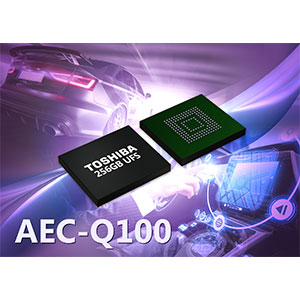Please select your location and preferred language where available.
Toshiba Memory adds BiCS FLASH-enabled UFS to lineup of embedded NAND flash memory products for automotive applications
Addresses data storage demands, including increased performance and capacity, required by connected and autonomous vehicle applications
- Düsseldorf, Germany, 25 March 2019
Toshiba Memory Europe GmbH today announced that it has begun sampling new Automotive UFS JEDEC ver. 2.1 embedded memory solutions. The company's Automotive UFS supports a wide temperature range (-40°C to +105°C), meets AEC-Q100 Grade2 requirements and offers the enhanced reliability required by various automotive applications. The lineup consists of four capacities: 32 gigabytes (GB), 64GB, 128GB, and 256GB[1].
The new products are embedded NAND flash memory devices that integrate BiCS FLASH 3D flash memory and a controller in a single 153-ball FPGA package. They include a HS-G3 interface and operate from a supply of 3.3V (memory core) and 1.8V (interface).

With connected cars and autonomous vehicles expected to generate enormous quantities of data, the storage requirements for automotive applications will continue to increase. TME's BiCS FLASH-enabled UFS devices provide customers with an option that is better suited to support their high-performance and density needs than existing e-MMC and UFS devices. For example, the 256GB product's sequential read and write performance are improved by approximately 6 percent and 33 percent, respectively, over previous generation devices[2].
The performance benefits of UFS have made it the mainstream memory choice for high-end and mid-tier smartphones and as automotive applications increase in complexity and data storage needs, UFS is expected to become the solution of choice in those applications. Toshiba was the first to introduce UFS memory (in 2013), placing them in a unique position to anticipate and support evolving applications, thereby enabling the transition to UFS.
Several functions have been added to TME's Automotive UFS, such as refresh, thermal control and extended diagnosis, which are well-suited to the requirements of automotive applications. The refresh function can be used to refresh data stored in UFS, and helps to extend the data's lifespan. The thermal control function protects the device from overheating in the high-temperature environment that can occur in automotive applications. Lastly, the extended diagnosis function helps users easily understand the device's status.
Technology advances in automotive information and entertainment systems, Advanced Driving Assistant Systems (ADAS) and autonomous driving will continue to push the storage demands in automotive applications ever higher. As these demands continue to grow, TMA will retain a leadership position in the market by reinforcing its lineup of high-performance, high-capacity memory solutions targeting the sector.
The 64GB, 128GB and 256GB versions are sampling now and the 32GB version will follow before June 2019.
Notes:
[1] Product density is identified based on the density of memory chip(s) within the Product, not the amount of memory capacity available for data storage by the end user. Consumer-usable capacity will be less due to overhead data areas, formatting, bad blocks, and other constraints, and may also vary based on the host device and application. For details, please refer to applicable product specifications. The definition of 1GB = 230 bytes = 1,073,741,824 bytes.
[2] Toshiba Memory Corporation's previous generation 128GB device (THGAF9T0L8LBAB8)
Company names, product names, and service names mentioned herein may be trademarks of their respective companies.
###
About Toshiba Memory Europe GmbH
We, Toshiba Memory Europe GmbH, are the European business of Toshiba Memory Corporation. Our company offers a broad product line of flash memory products, including SD Cards, USB flash drives, and embedded memory components, in addition to solid state drives (SSD). Our company maintains offices in Germany, France, Spain, Sweden and the United Kingdom. President is Masaru Takeuchi.